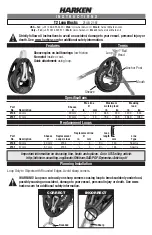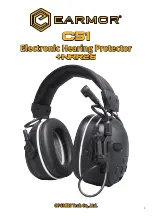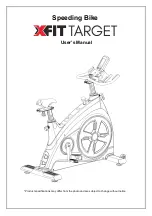
1.0 Warnings and Important Information
This product is part of a personal fall arrest, restraint, work positioning, suspension, or rescue system. A Personal Fall Arrest System (PFAS) is
typically composed of an anchorage and a Full Body Harness (FBH), with a connecting device, i.e., a Energy Absorbing Lanyard (EAL), or a
Self-Retracting Device (SRD), attached to the dorsal D-ring of the FBH.
These instructions must be provided to the worker using this equipment. The worker must read and understand the manufacturer’s instructions for
each component or part of the complete system. Manufacturer’s instructions must be followed for proper use, care, and maintenance of this
product. These instructions must be retained and be kept available for the worker’s reference at all times. Alterations or misuse of this product, or
failure to follow instructions, may result in serious injury or death.
A Fall Protection Plan must be on file and available for review by all workers. It is the responsibility of the worker and the purchaser of this
equipment to assure that users of this equipment are properly trained in its use, maintenance, and storage. Training must be repeated at regular
intervals. Training must not subject the trainee to fall hazards.
Consult a doctor if there is reason to doubt your fitness to safely absorb the shock of a fall event. Age and fitness seriously affect a worker’s ability
to withstand falls. Pregnant women or minors must not use this equipment.
ANSI limits the weight of fall protection equipment users to a maximum of 310 lbs. Products in this manual may have a rated capacity exceeding
ANSI capacity limits. Heavy users experience more risk of serious injury or death due to falls because of increased fall arrest forces placed on the
user’s body. In addition, the onset of suspension trauma after a fall even may be accelerated for heavy users.
The user of the equipment discussed in this manual must read and understand the entire manual before beginning work.
NOTE: For more information consult the ANSI Z359 or CSA Z259 body of standards.
•
Avoid moving machinery, thermal, electrical and/or chemical hazards as contact may cause serious injury or death.
•
Avoid swing falls.
•
Follow the weight restrictions and recommendations in this manual.
•
Remove from service any equipment subjected to fall arrest forces.
•
Remove from service any equipment that fails inspection.
•
Do not alter or intentionally misuse this equipment.
•
Consult FallTech when using this equipment in combination with components or subsystems other than those described in this manual.
•
Do not connect rebar hooks, large carabiners, or large snap hooks to the FBH dorsal D-rings as this may cause a roll-out condition and/or
unintentional disengagement.
•
Avoid sharp and/or abrasive surfaces and edges.
•
Use caution when performing arc welding. Arc flash from arc welding operations, including accidental arcs from electrical equipment, can
damage equipment and are potentially fatal.
•
Examine the work area. Be aware of the surroundings and workplace hazards that may impact safety, security, and the functioning of fall arrest
systems and components.
•
Hazards may include but not be limited to cable or debris tripping hazards, equipment failures, personnel mistakes, moving equipment such as
carts, barrows, fork lifts, cranes, or dollies. Do not allow materials, tools or equipment in transit to contact any part of the fall arrest system.
•
Do not work under suspended loads.
WARNING
IMPORTANT
MSRD20 Rev B
110421
3




































